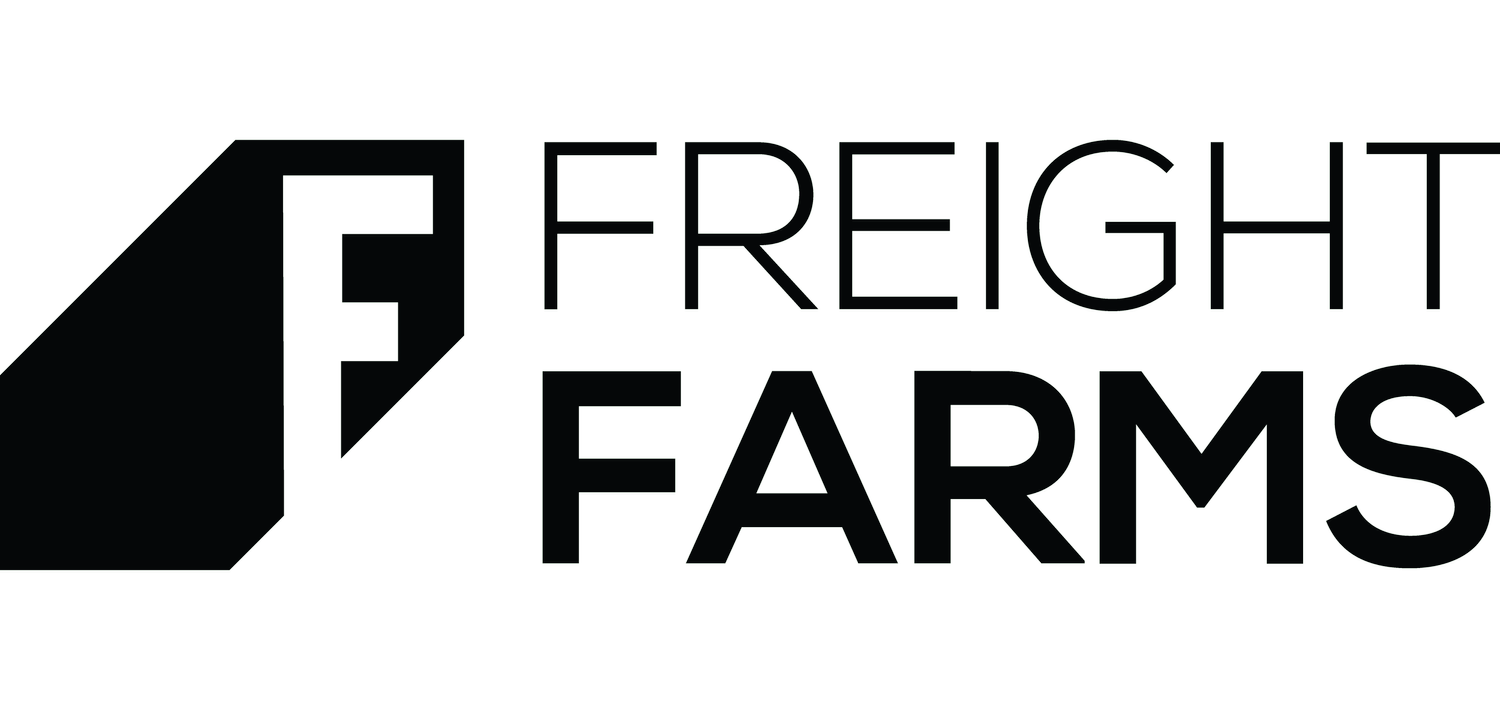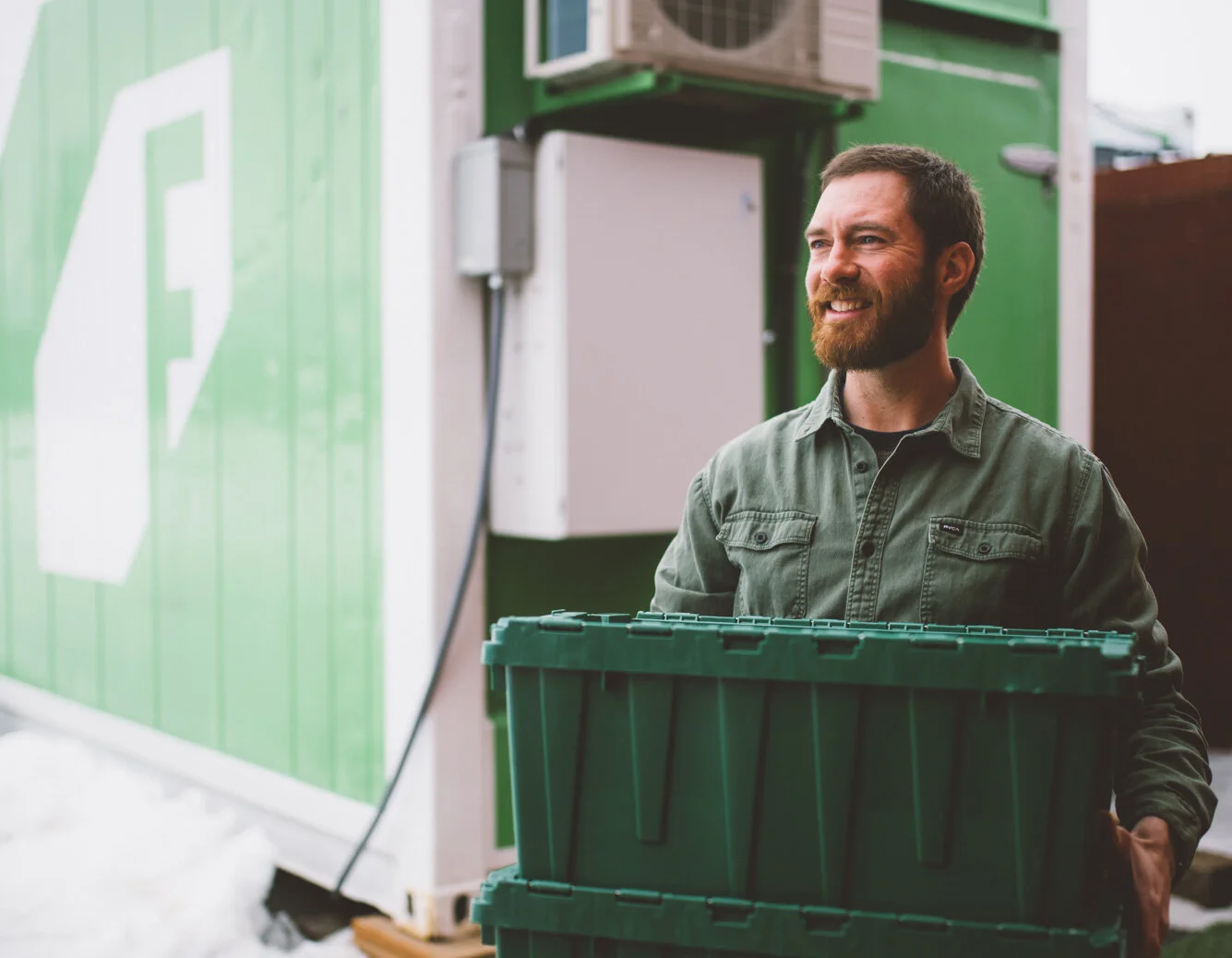By day he supports Freight Farmers. By night he is one.
Our head of Client Services, David Harris, teamed up with his brother Travis to launch Brothers in Farms in Georgia!
Freight Farms: What’s the story behind your Freight Farms project?
Travis Harris: To be honest, it’s a remarkably simple story. Since we were born, my brother and I have always been best friends and have had big dreams, dreams of helping people and being good to the earth. We began Brothers in Farms with the purpose of doing both of those things: being a team and helping the world. Dave found his calling in hydroponics while I focused more on conventional farming and together we saw a chance to help through farming. With both our experience being centered around farming, it just made sense.
Dave at a Freight Farms Open House
Travis at the Brothers in Farms farm in Georgia
Photo: Lucy Ni Shen Hewitt, @thegirlwithabigappetite, www.lucy-nishen.com
“The more time I spent in the farm, the more I could see myself doing something similar to other Freight Farmers.”
FF: Give us a quick refresher– what was your experience with farming before becoming a Freight Farmer?
David Harris: I’ve spent the past year and a half working with the Leafy Green Machine at Freight Farms as the head of our Client Services team, and really fell in love with the technology and the hardware. The more time I spent in the farm, the more I could see myself doing something similar to other Freight Farmers.
TH: I have worked for two years and continue to work part time on a small certified organic farm in Darien, GA. The bugs are insufferable, from the sand gnats to the horse flies, the winters are cold and summers a heavy humid hot, but I love it. It’s good for the soul.
FF: So, now that you're up and growing, what’s your favorite crop to grow and why?
TH: At the beginning, we tested some different things including flowers. I really enjoyed the Versailles Cosmos flowers, as did my mother. In terms of a cash crop, the D’Avignon radishes are by far the most fun. The growth is notable each day, and they are a delicious treat in case I get hungry.
DH: My favorite crop to grow in the LGM is probably butterhead lettuce. I love the way it splays out across the tower and forms a really full delectable looking head.
FF: Can you tell us your favorite customer story?
TH: A customer story that touched my heart recently was when a woman came to my stand at the Saturday farmers market and immediately began choosing some heads of lettuce and radishes. I noticed that she had her debit card in her hand, and after packaging the vegetables for her I had to inform her that we didn’t accept cards yet, but it was okay, because she could have them anyways. All I asked in return was that she follow us on Instagram and enjoy her soon-to-be-delicious salads. She was understandably surprised, but then informed me that she had only come because her mother loved our lettuce and she couldn’t make it on that day. It made both Dave and me feel good to know that we have a support system forming. Brothers in Farms is on its way to fulfilling its purpose.
FF: What was the most challenging part of becoming a Freight Farmer and how were you able to overcome it?
TH: For me, the most challenging part of becoming a Freight Farmer has been choosing a niche market and attempting to appeal to them. Farmers markets have been a reliable source so far, but the concept of hydroponics is alarming to many of the established southerners; “No Soil, No Soul” is a well shared sentiment. However, we hope thorough explanations, visuals, and meticulous work ethic, we will help people trust “the farming of the future” more.
DH: For me, the most challenging thing was just the logistics of getting the farm from point A to point B. We bought our unit second-hand, so there was a lot of headache in finding the right person to do it for a good price. Hindsight 20/20, I would have let Freight Farms handle the logistics for me.
“[Being a farmer has] also made me better at supporting other Freight Farmers. Having the firsthand experience and dealing with the same small everyday fixes has made me much more empathetic.”
FF: Have you noticed that your life has changed since becoming a Freight Farmer?
DH: I was obviously super comfortable with the farm before any of this started. What I didn’t prepare for was just how much time and energy goes into thinking about the farm everyday–I mean, it’s our baby! It’s also made me better at supporting other Freight Farmers. Having the firsthand experience and dealing with the same small everyday fixes has made me much more empathetic.
TH: Owning my own business and actually running it at the same time has been a big change. Thank God Dave is here; “Got a problem, Call Dave!” right? It’s tough, but farming like this is the best feeling in the world. I’m living my dream now, so I can’t even call what I do for a living “work” any more. That’s an awesome feeling.
“Being the new guy in town is never easy, so put the hours in early and make some connections: They will save you.”
FF: What’s the best piece of advice you can give to people interested in becoming Freight Farmers?
TH: I suggest you learn about your market and begin “planting seeds” with potential clients as soon as you are seriously considering being a Freight Farm. Being the new guy in town is never easy, so put the hours in early and make some connections: They will save you.
DH: I couldn’t agree more with Travis. One additional piece of advice I would add is don’t plant the full farm until you have buyers lined up. Instead, plant a bunch of variety in small quantities to hand out as samples and test the market. Then, once you find those connections, you can start growing that they need.















